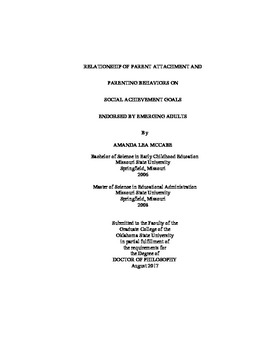| dc.contributor.advisor | Vogler, Jane S. | |
| dc.contributor.author | McCabe, Amanda Lea | |
| dc.date.accessioned | 2018-04-23T19:35:40Z | |
| dc.date.available | 2018-04-23T19:35:40Z | |
| dc.date.issued | 2017-08 | |
| dc.identifier.uri | https://hdl.handle.net/11244/299528 | |
| dc.description.abstract | Scope and Method of Study: The purpose of this study was to examine the relationship of helicopter parenting behaviors, autonomy supportive parenting behaviors, and attachment on the social achievement goals (i.e., social development goal, social demonstration approach goal, and social demonstration avoid goal) endorsed by emerging adults. Multiple regression analyses were run in order to examine the relationship between helicopter parenting behaviors, autonomy supportive behaviors, and parental attachment with social achievement goals. Mothers and Fathers were examined separately, thus resulting in two separate datasets. Interaction effects testing for attachment as a moderator between helicopter parenting behaviors and social achievement goals were run for both mother and father datasets. | |
| dc.description.abstract | Findings and Conclusions: Regression analyses revealed helicopter parenting behavior was a significant predictor of social demonstration avoid and social demonstration approach goals for both the mother and the father. A significant interaction effect was revealed with attachment serving as a moderator for the relationship between helicopter parenting behaviors by the mother and social demonstration avoid goal. Emerging adults endorsed social demonstration avoid goal when they perceived high helicopter parenting behaviors and high attachment from the mother. In addition, a significant interaction effect was revealed with attachment serving as a moderator between helicopter parenting by the father and social development goal. Emerging adults endorsed social development goal when perceiving high helicopter parenting behaviors and high attachment from the father. It is noteworthy that although emerging adults may have the same perceptions of helicopter parenting behaviors for both mothers and fathers, they will endorse different social achievement goals depending on the gender of the parent who enacts those behaviors. These findings warrant further exploration. By examining the relationship of parental influences on social achievement goals, this study contributes insight for ways in which parents can support their emerging adult child's transition to college, ultimately helping their child achieve positive social and academic outcomes. | |
| dc.format | application/pdf | |
| dc.language | en_US | |
| dc.rights | Copyright is held by the author who has granted the Oklahoma State University Library the non-exclusive right to share this material in its institutional repository. Contact Digital Library Services at lib-dls@okstate.edu or 405-744-9161 for the permission policy on the use, reproduction or distribution of this material. | |
| dc.title | Relationship of parent attachment and parenting behaviors on social achievement goals endorsed by emerging adults | |
| dc.contributor.committeeMember | Jacobs, Sue C. | |
| dc.contributor.committeeMember | Mwavita, Mwarumba | |
| dc.contributor.committeeMember | Montgomery, Diane | |
| osu.filename | McCabe_okstate_0664D_15168.pdf | |
| osu.accesstype | Open Access | |
| dc.type.genre | Dissertation | |
| dc.type.material | Text | |
| thesis.degree.discipline | Educational Psychology | |
| thesis.degree.grantor | Oklahoma State University | |
